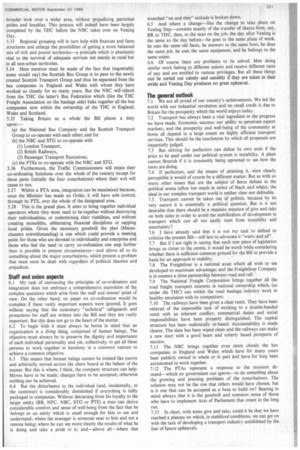Staff and union aspects
Page 225

If you've noticed an error in this article please click here to report it so we can fix it.
6.1 My task of canvassing the principles of co-ordination and integration does not embrace a comprehensive exposition of the complex questions which arise from the staff and unions' point of view. On the other hand, no paper on co-ordination would be complete if these vastly important aspects were ignored. It goes without saying that the customary "technical" safeguards and protections for staff are written into the Bill and they are vastly important. But this does not go to the heart of the matter.
6.2 To begin with it must always be borne in mind that an organization is a living thing, composed of human beings. The objective must always be to preserve the dignity and importance of each individual personality and yet, collectively, to get all these persons to work together in harmony in a common venture to achieve a common objective.
6.3 This means that human beings cannot be treated like pawns and arbitrarily moved across the chess board at the behest of the master. But this is where, I think, the company structure can help. Moves have to be made; changes have to be accepted; otherwise nothing can be achieved.
6.4 But the disturbance to the individual (and, incidentally, to the customer) is considerably diminished if everything is tidily packaged in companies. Without detracting from his loyalty to the larger entity (BR, NFC, NBC, STG or PTE) a man can derive considerable comfort and sense of well-being from the fact that he belongs to an entity which is small enough for him to see and understand; where the manager is someone near to him and not a remote being; where he can see more clearly the results of what he is doing and take a pride in it; and—above all—where that wretched "we and they" attitude is broken down.
6.5 And where a change—like the change to take place on Vesting Day—consists mainly of the transfer of shares from, say, BR to THC, then, to the man on the job, the day after Vesting is the same as the day before—he goes to the same place of work, he sees the same old faces, he answers to the same boss, he does the same job, he uses the same equipment, and he belongs to the same union.
6.6 Of course there are problems to be solved. Men doing similar work belong to different unions and receive different rates of pay and are entitled to various privileges. But all these things can be sorted out calmly and sensibly if they are taken in their stride and Vesting Day produces no great upheaval.


















































































































































































































































































































































































